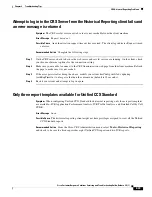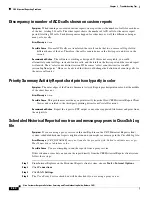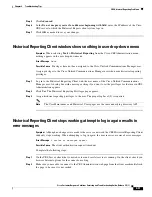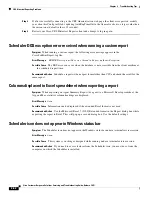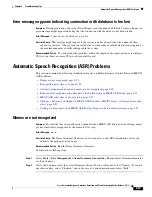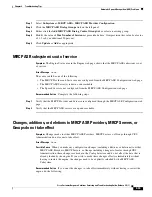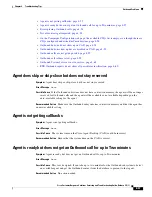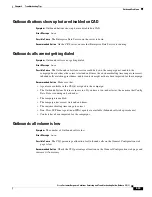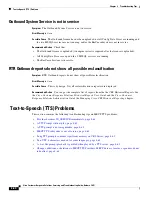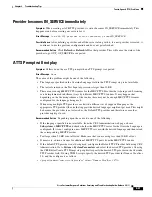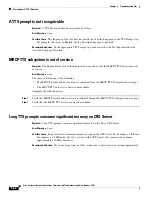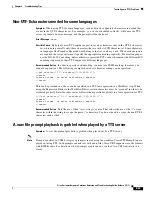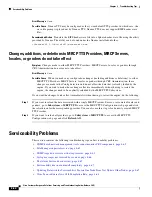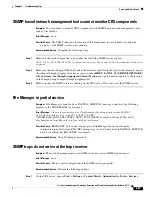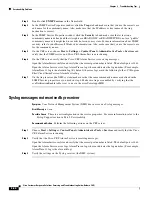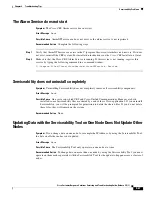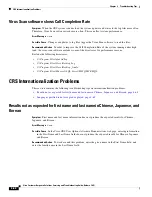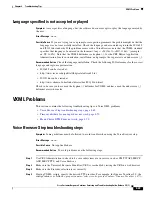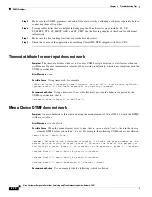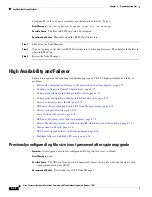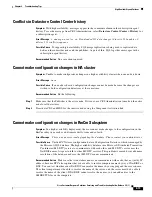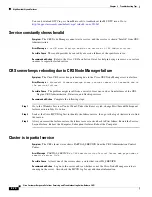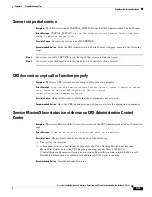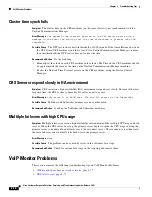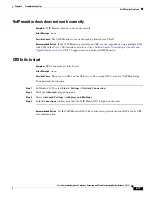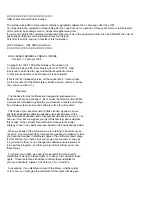
8-63
Cisco Customer Response Solutions Servicing and Troubleshooting Guide, Release 5.0(1)
Chapter 8 Troubleshooting Tips
Text-to-Speech (TTS) Problems
Non-UTF-8 characters needed for some languages
Symptom
When using TTS for some languages, such as French or Spanish, characters are needed that
are not in the UTF-8 character set. For example:
ç
,
é
or
ñ
if not handled correctly, will cause the TTS
server to generate an error message, and the prompt will not be heard.
Error Message
None.
Possible Cause
By default, most TTS engines expect to receive characters only in the UTF-8 character
set, which are generally only those characters that are in the ASCII character set. Some characters
in languages like French or Spanish do not belong to that set, such as
ç
,
é
or
ñ
. When such characters
are required the script writer must specify the appropriate encoding explicitly. For most languages,
use the ISO-8859-1 encoding, unless otherwise specified. TTS vendors document the different ISO
encodings required by their TTS engines for different languages.
Recommended Action
In order to specify such encoding, you must use SSML markup; therefore, you
cannot use plain text. The following example shows how character coding can be specified:
<?xml version="1.0" encoding="ISO-8859-1"?>
<speak>
Buonas tardes. Le estoy hablando en español.
</speak>
This can be provided in a file or can be specified in a TTS text expression in a Workflow step. When
using the Expression Editor in the Workflow Editor, certain characters must be "escaped" in order to be
evaluated properly. Enter the same text as follows when specified explicitly in a text expression for TTS:
u"<?xml version=\"1.0\" encoding=\"ISO-8859-1\"?>
<speak>
Buonas tardes. Le estoy hablando en español.
</speak>
Recommended Action
Note the use of the
u"<text string>"
syntax. That allows the use of the "\" escape
character within the string to escape the quote (") characters. You do not need to escape the non-UTF-8
characters such as the
ñ
.
A .wav file prompt playback is garbled when played by a TTS server
Symptom
A .wav file prompt playback is garbled when played out by a TTS server.
Note
Prompts specified in VXML scripts or prompts created using the workflow CreateTTSPromptStep are
played out using TTS. Such prompts can mix text with audio files. Cisco CRS supports wave file formats
with RIFF headers. For details on where prompts are played out, see the
Cisco CRS Administration
Guide
.
Summary of Contents for Cisco Unified Queue Manager
Page 21: ...P A R T I Serviceability ...
Page 22: ......
Page 61: ...P A R T I I Troubleshooting ...
Page 62: ......

